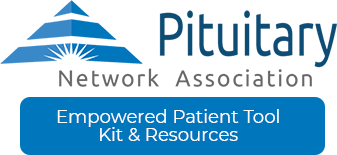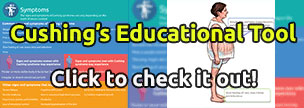
“Values are related to our emotions, just as we practice physical hygiene to preserve our physical health, we need to observe emotional hygiene to preserve a healthy mind and attitudes.”
— Dalai Lama
PNA Medical Corner: fluid discharge protocols after surgery
 This month the PNA Medical Corner features an article co-authored by Dr. Juan Carlos Fernandez-Miranda of Stanford University, a longtime member of the PNA. The research concludes that fluid restriction protocols on an outpatient basis after pituitary surgery can work but require a lot of patient communication and education.
This month the PNA Medical Corner features an article co-authored by Dr. Juan Carlos Fernandez-Miranda of Stanford University, a longtime member of the PNA. The research concludes that fluid restriction protocols on an outpatient basis after pituitary surgery can work but require a lot of patient communication and education.
Patient and caregiver perspectives of fluid discharge protocols following pituitary surgery
PMID: 38545460 PMCID: PMC10965805 DOI: 10.1016/j.jcte.2024.100336
Abstract
Background: Post-operative fluid restriction after transsphenoidal surgery (TSS) for pituitary tumors may effectively prevent delayed hyponatremia, the most common cause of readmission. However, implementation of individualized fluid restriction interventions after discharge is often complex and poses challenges for provider and patient. The purpose of this study was to understand the factors necessary for successful implementation of fluid restriction and discharge care protocols following TSS.
Methods: Semi-structured interviews with fifteen patients and four caregivers on fluid discharge protocols were conducted following TSS. Patients and caregivers who had surgery before and after the implementation of updated discharge protocols were interviewed. Data were analyzed inductively using a procedure informed by rapid and thematic analysis.
Results: Most patients and caregivers perceived fluid restriction protocols as acceptable and feasible when indicated. Facilitators to the protocols included clear communication about the purpose of and strategies for fluid restriction, access to the care team, and involvement of patients’ caregivers in care discussions. Barriers included patient confusion about differences in the care plan between teams, physical discomfort of fluid restriction, increased burden of tracking fluids during recovery, and lack of clarity surrounding desmopressin prescriptions.
The FDA has approved NGENLA (somatrogon-ghla)
The FDA has approved NGENLA (somatrogon-ghla), a once-weekly, human growth hormone analog indicated for treatment of pediatric patients aged three years and older who have growth failure due to an inadequate secretion of endogenous growth hormone.
Count on your Xeris CareConnection™ Team for unparalleled Cushing’s Support
Cushing’s can be challenging, but there is support so patients can feel like themselves again. The main goal of treating Cushing’s is to get cortisol levels back to normal. This Pituitary Awareness Month, Xeris Pharmaceuticals® is highlighting the importance of one-on-one support for patients living with Cushing’s Syndrome and support for HCPs treating Cushing’s Syndrome.
Sign up to get dedicated support:
Patients: Sign up for support | Recorlev® (levoketoconazole)
HCP’s: Connect with Xeris support | RECORLEV® (levoketoconazole)
Have more questions? Call for more support at 1-844-444-RCLV (7258)
Copyright © 2024 Pituitary Network Association All rights reserved.
Disclaimer: PNA does not engage in the practice of medicine. It is not a medical authority, nor does it claim to have medical expertise. In all cases, PNA recommends that you consult your own physician regarding any course of treatment or medication.
Our mailing address is:
Pituitary Network Association
P.O. Box 1958
Thousand Oaks, CA 91358
(805) 499-9973 Phone - (805) 480-0633 Fax
Email info@pituitary.org
You are receiving this Newsletter because you have shown interest in receiving information about our activities.
If you do not want to receive any more emails from PNA, Unsubscribe.











